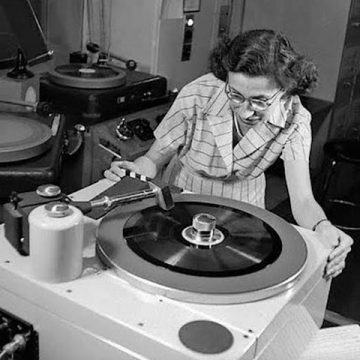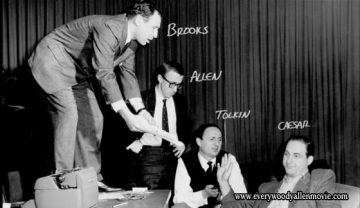by Akim Reinhardt
Stuck is a new weekly serial appearing at 3QD every Monday through early April. A table of contents can be found here.
Prologue: Full of Sound and Fury
 Last year we drove across the country. We had one cassette tape to listen to on the entire trip. I don’t remember what it was. —Steven Wright
Last year we drove across the country. We had one cassette tape to listen to on the entire trip. I don’t remember what it was. —Steven Wright
You sing it in the shower and in the car. You slap your thighs and lip sync at work. Eventually you try to ignore it, but on and on it goes. You often don’t remember when it began. Worst of all, you have no idea how to make it stop. Good, bad, or otherwise, the song has a hold on you, and there’s nothing you can do about it.
Then, poof! It’s gone.
You don’t know what you did. Probably nothing. Nor can you pinpoint a specific moment when the song slipped away, unnoticed. While it was here, there was no escaping it. But when you weren’t looking, it magically flittered away, like pixie dust losing its shimmer in the breeze; the spell has been broken and you are finally free.
I’m no different from other people, except when I am.
Left to its own devices, my mind will usually fill the blank spots with music. Walking down the street, cooking dinner, lazing around the house: most activities are accompanied by a random soundtrack in my head. Even while doing something that requires substantial concentration, such as writing this book for example, I usually hear music.
Simply put, music clings to me. All kinds, really. Any genre. Rock, blues, pop, folk, jazz, hip hop, classical, avante-garde, whatever. Things I like, things I don’t. A song I heard on the radio. The theme to a TV program. Something playing in the supermarket, or blaring out the window of someone else’s car, or honestly from lord knows where. From far and wide, it finds me and holds on tight. Pieces of songs, scraps of this and that, melodies and chords, beats and rhythms parade through my brain, one after the next, a vast array of sound, ever changing.
Until a something gets stuck. Some folks call it an “earworm.”
I’ve never cared for that metaphor. Yes, it comes from without and burrows in. But to me, it never feels like some squirmy little thing writhing around my ear canal. When a song overtakes me, it fills up my entire being, from head to toe, as if I’m possessed by a musical ghost doomed to haunt me until some mysterious curse is lifted. And until then, this melodic specter and I are bound together, moving through each other effortlessly and seemingly endlessly.
Does it last a day? Sure. Two? Why not. Three or four? A bit exasperating, yet still manageable.
But there’s stuck, and there’s Stuck. A week or two or more? The same goddamn song in a closed circuit, circling round and round for half a month or longer?
That’s how I live.
Not always. Just now and again, I find myself trapped in a drawn out feedback loop.
It took me a while to realize that few folks, even those who love and listen to a lot of music, are periodically badgered by a single tune for weeks at a time. For most of my life, I just assumed that everyone went through that once in a while. But as best I can tell, most people only have to endure it for a day or two or three. I get those short bouts too. So often I don’t even notice. But two weeks? A month?
Maybe it’s some sort of “gift.” Or perhaps, as I suspect, I really am broken. Regardless, whether a prophet or a patient, by 2013 I was desperate for a coping mechanism, a way to deal with shit instead of merely enduring it. That year I made a decision: when one of these restless, musical apparitions wrapped itself around my soul, I would try to write about it.
But write what? The truth is, I had no interest in figuring out why this happens. I wanted to write for sweet relief, not tinker with mechanical questions about cause. I simply accept that it happens and always will; I’m untempted by fruitless quests for a mythical, preventative “cure.”
Rather, my goal was more esoteric. I wanted to know what it means.
What does it say about me? About all of us? What can it tell me about life? Is there a method to the melodic madness? Can I descry any truth amid the blur of this accursed carousel?
 But the decision to write was also born of a fragile, selfish hope; that it might help exorcize the wraiths, or at least broker some form of reconciliation with the musical phantoms that stalk me. That I could learn to dance with ghosts.
But the decision to write was also born of a fragile, selfish hope; that it might help exorcize the wraiths, or at least broker some form of reconciliation with the musical phantoms that stalk me. That I could learn to dance with ghosts.
I did not know what I would find, but assumed it would be more than I was looking for. That if I attempted to dislodge a song from my head, plenty of other things would probably tumble out with it. So I decided not to contrive or predetermine essay topics. I wanted to approach it organically, to be honest and open, to keep it simple and take it as it happens. My pen would be guided by whatever themes bubbled up from the frenzy, full of sound and fury and signifying anything.
However, I also wanted to avoid an aimless, self-indulgent journey into endless entropy. For while everything emerges from chaos, the pandemonium periodically produces repetitive refrains.
To frame the free-flowing chaos, I set some basic parameters. Short term tenants, songs that hang out in my head for no more than a few days, are too pedestrian. Too corporal. Too wormy. I decided not to tussle with anything that latched onto me for less than two full weeks. But I would not avoid any that did. Do not shirk. Take them as they come, let them lead the way, and keep an eye out for signposts and augurs amid the maelstrom.
What follows then are the actual demons, in the order they appeared. Twenty-one songs that, in intervals over a five year period, utterly dominated my life for the better part of a month or more. Among them, the oldest is from 1966, before I was born. The newest was recorded in 2016, after I’d already spent three years working on this project. Most of them are one form or another of rock n roll, loosely defined, from cheesy pop to hard rock. However, R&B, funk, and country also drop in.
I didn’t pick these songs because they already had some special meaning to me, or because they’re personal favorites, or because they reflect the full breadth of my musical interests, or because they’re good. I didn’t pick these songs at all. They picked me. I don’t even care for some of them. But all of them staked a claim to my consciousness and would not relent; I am merely looking for a way to fight back. Not against them, but against myself.
I have used these songs to crack myself open. Sometimes a given song has served as a sturdy lever and split me cleanly. Sometimes the pressure was too great and everything snapped, leaving both me and the song in broken pieces on the floor. And like an ancient priest, I stare at the scattered fragments, trying to divine some meaning, to translate the will of the sacred ancestors. But whether I’m offering up grave insights into the depths of my soul and human nature, or spouting meaningless gibberish couched in celestial trickery, I cannot say. All I know is that the effort to decipher the songs that get stuck in my head has led me on a strange voyage that has been at turns frustrating and a great relief.
I have written about the music. I have written about myself. I have written about all of us and this wobbly world of ours. I have set sail, leaving the mapped and the known behind me. I did not chart the path or pilot the ship. From time to time, the billowy gusts have simply taken it upon themselves to fill my sails and send me where they will. I have made no attempt to guide the rudder or to question how, when, or why the winds wail. What follows are the meanderings, grumblings, and tittle tattle of one man and his squawking albatrosses, alone with each other on a boat adrift in open waters, bouncing to the rhythm of the song.
*
Chapter 1: Who Am I? The Allman Brothers, “Win, Lose, or Draw” (May, 2013)
 Growing up in the Bronx during the 1970s and 80s, my father was the only WASP I knew. All the white people were either Catholic or Jewish, with the occasional Eastern Orthodox mixed in. The only Protestants were black.
Growing up in the Bronx during the 1970s and 80s, my father was the only WASP I knew. All the white people were either Catholic or Jewish, with the occasional Eastern Orthodox mixed in. The only Protestants were black.
But Kenny Lee Reinhardt wasn’t just a White Anglo Saxon Protestant. He was a Southern redneck, born and partially raised in rural North Carolina.
Without any irony whatsoever, my father occasionally wore a cowboy hat. He would talk back to the lyrics of blues and gospel songs. He carried a boy scout knife on his key chain, considered it a vital tool, and made sure I had one when I turned twelve. When it was time for me to come up for dinner, he’d place his thumb and middle finger into the corners of his mouth and send out a piercing two tone whistle that you could hear, I do not exaggerate, half-a-mile away. If I dallied, as kids on the playground are wont to do, and made him get within shouting distance, his drawl would start to seep out and his vowels would bend a bit as he bellowed forth an ominous question like: Boy! You want this boot up yer ass?
To some extent, how my father behaved and carried himself seemed perfectly natural to me; he was just my dad. But at the same time, his ways could be distant and confusing. It’s not that other parents didn’t use public threats of violence as a disciplining tool; it was the 1970s after all. But none of the other New York City dads I knew ever wore pointed toe boots, much less threatened to put one of ‘em up yer ass. The other Bronx dads had different colloquialisms.
Yet it would be simplistic and misleading to cast my father as only a Southern redneck. His family moved to Fresno, California after World War II when he was still only 10 years old. He himself had moved to New York City in 1959 at the age of 22, and then spent years working in off-off Broadway theater. Shortly after I was born, he converted to Judaism to appease his in-laws. And nobody actually called him Kenny Lee. Not even down home. He was just Ken.
My father hadn’t recently bounced off a flat bed truck rambling north from Dixie. By the time I was born, it had been two decades sine he’d lived in the South and only fragments of his accent remained. But that hardly meant the man I heard sing “Drop Kick Me Jesus Through the Goal Posts of Life” one day while drying off after a shower, would ever fit in as a local. Far from it. No matter how long he lived in New York City, he always came across as someone from somewhere else. For while he was quite removed from his Southern upbringing in many ways, those elements he did retain stood in sharp contrast to everything else in my Northern, urban environment.
My father also provided the only real insight I had into that side of my heritage. His dad was dead. His mother lived in California. Her accent was thicker than his mild drawl, but she too hadn’t lived in the South for thirty years by the time I was in elementary school. My parents brought me down to North Carolina when I was a few months old, but we’d never been back since, and I had very little contact with that branch of the family during childhood. By contrast, my mother’s Jewish immigrant parents lived a few neighborhoods over in the Bronx, her brother’s family was out on Long Island, and our neighborhood was mostly Jewish and Irish.
Growing up in the Bronx then, half of my family heritage seemed mysterious in ways that it did not for my friends who also came from mixed families. For example, my friend Erik was half-Italian and half-Puerto Rican. His mom was an isolate, like my dad. Her family was back on the island. But hundreds of thousands of Puerto Ricans live the Bronx; they were a vital thread in the city’s cultural fabric. It wasn’t difficult for Erik to get a sense of Puerto Rican culture firsthand. And even my friend Noah, who came from a more unusual mix of Jewish mother and Armenian father, had connections I didn’t. There was no Armenian community near us, but some of his Armenian relatives lived nearby.
Me? All I had was this dad who ate pork rinds and stashed a copy of Hank Williams 24 Greatest Hits in the record cabinet.
By the time I reached my teens, like many kids, I’d begun to wonder about who I was. I could’ve just been Jewish, I suppose. I had a bris (the Jewish circumcision ceremony) in my grandparents’ living room when I was 8 days old. A bar mitzvah at age 13. My papers were in good order, so to speak; in the eyes of Judaism I’m a landsman, a member of the tribe. If I ever apply to Israel for citizenship, by their own laws they have to accept me. I was also fairly enmeshed in modern Jewish culture. I grew up eating bagels and watching Woody Allen and Mel Brooks movies. And in some ways, oddly enough, I felt even more Jewish than most of the full Jews I knew, whose parents didn’t speak fluent Yiddish like my mother, whose grandparents weren’t immigrants like mine, who didn’t have any early 20th century Zionist settler relatives like I did on my grandfather’s side, and who hadn’t lost entire branches of their family in the Holocaust like my grandmother; joyously eating my immigrant grandmother homemade gefilte fish, not that disgusting, gelatinous crap from a jar that many full Jews consumed; and my grandfather went to schuyl (temple) most every morning, and read our Passover seder (holiday family dinner ritual) in Hebrew. Most of the Jews I grew up with were full on Jews, their lineage not “compromised” by intermarriage like mine was, but they were also just plain old Americans with no real connection to their immigrant past.
 As I approached my teenage years, I found that I didn’t really fit in with the full Jews in my neighborhood. Because beyond matrilineal descent laws, and despite attending Hebrew school for several years, the hard truth of is I’m only half-Jewish, raised by a father who was theoretically Jewish, but in practice was a good ole boy.
As I approached my teenage years, I found that I didn’t really fit in with the full Jews in my neighborhood. Because beyond matrilineal descent laws, and despite attending Hebrew school for several years, the hard truth of is I’m only half-Jewish, raised by a father who was theoretically Jewish, but in practice was a good ole boy.
And Judaism isn’t like Islam or Christianity; it’s not just a religion. It’s a religion and an ethnicity. Catholics might also be Italian or Mexican or Irish. Jews are just Jews. Yes, there can be complicated issues of faction and assimilation. But unlike being Christian, being Jewish is both your religion and your cultural group. Beyond theology, it demands a certain degree of fitting in. Yet as I came of age and my self-consciousness grew, I didn’t feel entirely at home within the larger American Jewish community. And in an odd kind of way, when my Jewish friends adamantly insisted that I was fully Jewish too, it only reinforced my alienation, because deep down I knew I wasn’t. It were as if they were trying to co-opt me by erasing part of me.
That’s not to say Judaism was some foreign appendage to my life like it was to my father, who always looked awkward wearing a yarmulke during the one or two times a year we found ourselves in a synagogue or at a Jewish wedding. He never seemed like he belonged there. He’d gone through a hardcore orthodox conversion (at his father-in-law’s insistence), and no one could deny that he was now technically Jewish, but it was always very obvious that he really wasn’t. Not even remotely, in a cultural sense. He was Kenneth Lee Reinhardt, that guy who wore ankle boots for dress shoes, drank vodka out of the bottle, and pronounced “roof” and “root” like they rhymed with “wood.”
Judaism came far more naturally to me than it did to him. But I also felt less Jewish than many of the Jews I knew growing up. It wasn’t about the laundry list of cultural items such as clothing, food, language, religion, etc. It was a more abstract feeling of belonging that wasn’t quite there, and I knew never would be. Whatever it meant to be a Jew, I had only some of it. Maybe more than half, but not the whole magilla.
Then again, I was hardly a redneck. Picking up my father’s pork rind habit was about the extent of it. Hell, I didn’t even keep a boy scout knife on my key chain like he wanted me to. I thought it was too weird and a bit clunky. When he found out that I didn’t carry it on my person, he was disappointed. It was like he’d failed as a father in some small way. That he hadn’t readied me for adult life.
As a teenager, amid this swirl of cultural confusion, I didn’t consciously go in search of my Southern heritage. Instead of actively pursuing it, the Southern Thang connected with me tangentially, mostly through music: during high school I was really into Southern rock.
In the early 80s, white American teenagers still mostly listened to what is now called Classic Rock, so that in itself wasn’t unusual. But in the Bronx, no one I knew owned any albums in the peculiar sub-genre of Southern rock. Zeppelin, the Doors, Hendrix, the Who, the Beatles, the Stones, Pink Floyd: that kinda stuff was all very popular on the radio and in teenage record collections. In the Bronx, however, Southern Rock was a side note. No one bashed it, and it did sift through the radio waves once in a while, but I didn’t know anyone who was actually “into it.”
I was into it.
It started with Lynyrd Skynyrd. I heard “Free Bird” for the first time when I was about 13. It was part of some holiday weekend radio station countdown of the all time greatest songs. I think it clocked in at #3 behind Eric Clapton’s “Leila” and Led Zeppelin’s “Stairway to Heaven.”
“Free Bird” blew me away. I had no idea you could do that with guitars, three of them at once no less. Soon I’d bought all of Skynyrd’s albums; five studio platters before the band’s infamous 1977 plane crash. And as I dove into their music, it wasn’t long before I also started getting albums by another Southern rock band: the Allman Brothers.
If Skynyrd piqued my teenaged interest in an overt and dedicated Southern machismo that seemed at once exotic and intimately familiar, then the Allman Brothers just did their thing, which happened to be Southern, but not only.
Though often credited as the grandfathers of Southern rock, the Allman Brothers Band actually preceded it. Southern rock didn’t emerge as a “thing” until a few years after their 1969 self-titled debut album. Hailing from the South and making their home base in Macon, Georgia, the Allman Brothers were absolutely every bit as Southern as Lynyrd Skynyrd (each band hailed from Florida and originally had one Northern interloper). And as with Skynyrd, their music was enmeshed in Southern traditions. But it wasn’t confined by them.
Though rooted in Southern music, the Allman Brothers also seamlessly incorporated elements of jazz and psychedelia. And unlike the Southern rock bands that followed them, being Southern wasn’t a source of bravado for the Allman Brothers Band. They didn’t define and pigeon hole themselves as “Southerners.” Being Southern seemed more of a happenstance than the central identity marker that it was for bands like Skynyrd. Sometimes the Allmans sung about vaguely Southern themes, but they very rarely sung about the South explicitly or about being Southern. Their Southerness was organic. It was very much a part of their music, but they never forced it, never waved it in your face like some garish Confederate battle flag. Being Southern is who they were, not a badge they wore. They were distinctly Southern, and never hid from it, but they also transcended it, which was reflected in their fan base: an odd blend of hippies, bikers, and rednecks.
When I started gobbling up Allman Brothers albums as a teenager, it soon became obvious to me that the band couldn’t be comfortably shoe horned into the ready made category that many radio DJs and music magazine writers had allotted them. On some level, of course, yes, they were obviously Southern Rock. On another, however, they really weren’t and never would be.
That was also kind of how I felt about myself: Jewish, but not. Jewish, but not just. And while I knew I wasn’t Southern in any real sense, whatever small, faded patch of it had rubbed off on me from my dad, marked me as different from my peers in the Bronx. None of them liked pork rinds. None of them could drive a 16d common nail flush with three strokes of a hammer. None of them owned both the live and studio versions of “Free Bird.”
As a teenager trying to figure out who I was, I didn’t consciously draw parallels between the music I listened to and the identity I was constructing. But they dovetailed anyway. In the case of the Allman Brothers, my thoughts about the music mirrored what I was coming to believe about life more generally. I am who I am. Somewhat unknowable, even to myself, and occasionally ill at ease among those who seek to define me. Like my father in a yarmulke and cowboy boots.
 We’re constantly at once in a state of becoming and unbecoming. Life is a process, not a portrait; a journey, not an end. And you don’t have to really know who you are to know that you’re not always whom others think you are. Because labels will define you only if you let them. And while they can be handy descriptors, labels are useful only up to a point before they get in the way; which is why you should play them cheap like pennies instead of proudly brandishing them like jewels. To settle for not knowing exactly who you are instead of letting them tell you.
We’re constantly at once in a state of becoming and unbecoming. Life is a process, not a portrait; a journey, not an end. And you don’t have to really know who you are to know that you’re not always whom others think you are. Because labels will define you only if you let them. And while they can be handy descriptors, labels are useful only up to a point before they get in the way; which is why you should play them cheap like pennies instead of proudly brandishing them like jewels. To settle for not knowing exactly who you are instead of letting them tell you.
Nest Monday . . . I’m a Man: Bill Conti, “The Theme to Rocky”.
A full Table of Contents can be found at Akim’s website: ThePublicProfessor.com.
